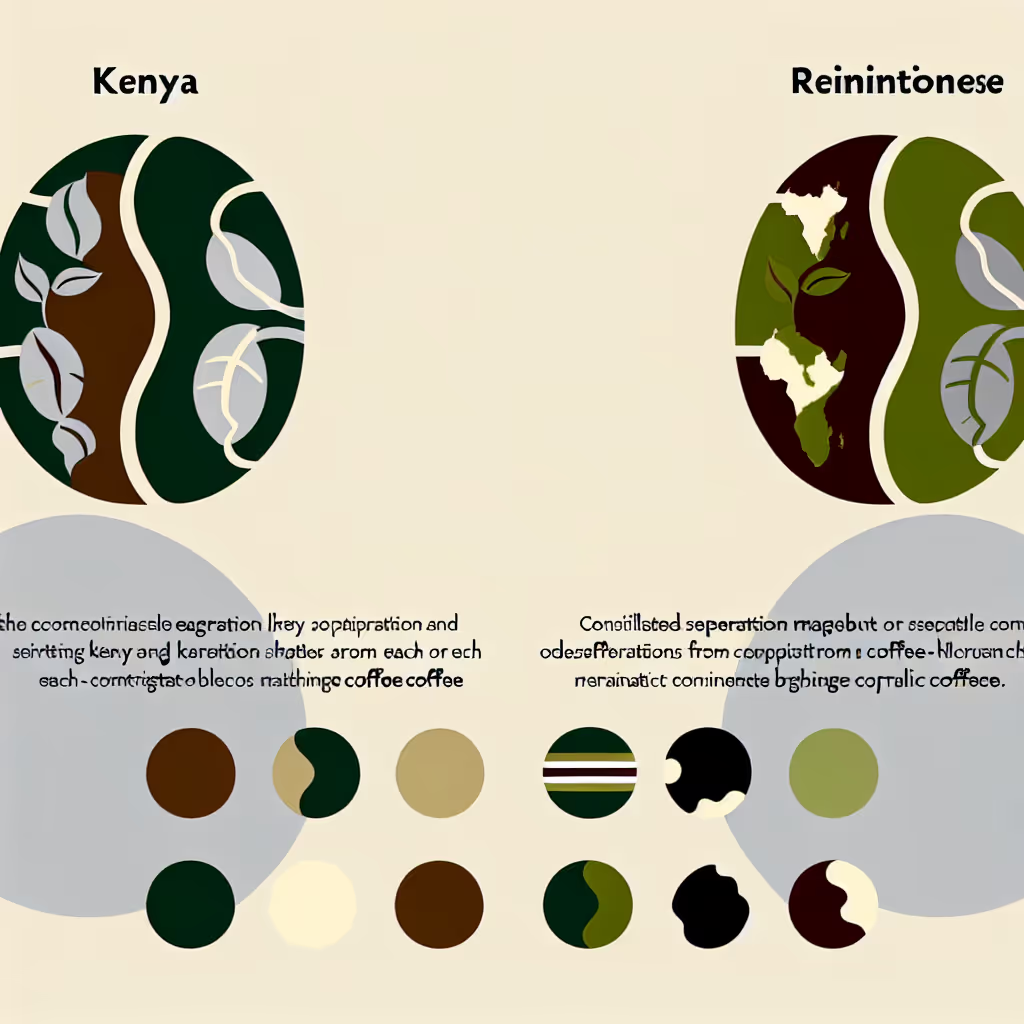Kenyan Vs. Réunionese Coffee
This comparison explores the distinct qualities of Kenyan and Réunionese coffee, highlighting their unique flavor profiles, growing conditions, and cultural significance for coffee enthusiasts seeking rare African beans.

Brief Description
Kenyan coffee is renowned for its bright acidity, full body, and complex flavor profile. Grown in the rich volcanic soils of the Central Highlands, these beans benefit from ideal climate conditions and meticulous processing. The result is a cup that's bold, wine-like, and often described as the 'connoisseur's choice'. With notes ranging from blackcurrant to citrus, Kenyan coffee offers a truly unique and memorable tasting experience.
Réunionese coffee, grown on the French island of Réunion in the Indian Ocean, is a rare and exquisite treat for coffee enthusiasts. Known for its unique Bourbon Pointu variety, these beans offer a delicate, complex flavor profile with low caffeine content. The volcanic soil and tropical climate of Réunion contribute to the coffee's distinctive character, making it a prized origin for specialty coffee lovers seeking something truly extraordinary.
Importance of Comparison
Comparing Kenyan and Réunionese coffee is crucial for coffee lovers looking to expand their palate with rare African beans. These origins offer vastly different flavor experiences, from Kenya's bold, wine-like acidity to Réunion's delicate, low-caffeine Bourbon Pointu. Understanding their unique characteristics helps consumers make informed choices and appreciate the diversity of African coffee.
Key Attributes
Origin
Kenyan
Réunionese


Consumer Guide
When choosing between Kenyan and Réunionese coffee, consider your flavor preferences and brewing methods. Kenyan coffee, with its bright acidity and full body, is ideal for those who enjoy bold, complex flavors. It excels in pour-over and French press brewing. Réunionese coffee, particularly the Bourbon Pointu variety, offers a more delicate, nuanced experience with lower caffeine content, making it perfect for afternoon sipping. Consider the rarity factor: while Kenyan coffee is more widely available, Réunionese coffee is a rare treat that may appeal to collectors. For the best experience, purchase freshly roasted beans from reputable sources and experiment with different brewing methods to find your perfect cup.
Expert Opinions
Coffee expert James Hoffmann notes, 'Kenyan coffee often represents the pinnacle of brightness and complexity in the cup, while Réunionese Bourbon Pointu offers a unique, delicate flavor profile rarely found elsewhere.' Barista champion Lem Butler adds, 'The contrast between these origins is striking. Kenyan coffee's bold, fruity notes make it a favorite for espresso blends, whereas Réunionese coffee's subtle complexity shines in filter brewing methods.'
FAQs
Kenyan coffee is known for its bright acidity, full body, and complex flavors including blackcurrant, citrus, and floral notes. Réunionese coffee, particularly the Bourbon Pointu variety, offers a more delicate profile with floral, citrus, and honey notes, and lower caffeine content.
Kenyan coffee benefits from high altitudes (1400-2100m) and volcanic soils in the Central Highlands, contributing to its bold flavor. Réunionese coffee grows at lower altitudes (600-1200m) in tropical island conditions, resulting in a more nuanced, delicate taste.
Kenyan coffee is generally preferred for espresso due to its full body and bright acidity, which can cut through milk in milk-based drinks. Réunionese coffee, being more delicate, is better suited for filter brewing methods that highlight its subtle flavors.
Réunionese coffee, especially the Bourbon Pointu variety, is extremely rare with an annual production of only 50 metric tons. In contrast, Kenya produces around 50,000 metric tons annually, making Kenyan coffee much more widely available.
Both origins excel in pour-over, French press, and cold brew methods. However, Kenyan coffee's bold flavors can withstand stronger brewing techniques, while Réunionese coffee's delicate profile is best highlighted through gentler methods like pour-over.
Yes, there is a notable difference. Kenyan coffee typically has a higher caffeine content, while Réunionese coffee, particularly the Bourbon Pointu variety, is known for its naturally low caffeine levels, making it a good choice for those sensitive to caffeine.
Conclusion
Kenyan and Réunionese coffees offer distinct experiences for the discerning coffee enthusiast. Kenyan beans provide a bold, complex cup with bright acidity and full body, ideal for those who enjoy intense flavors. Réunionese coffee, particularly the rare Bourbon Pointu, offers a more delicate, nuanced experience with lower caffeine content. While Kenyan coffee is more widely available and versatile in brewing methods, Réunionese coffee presents a unique opportunity to taste a truly rare origin. Ultimately, the choice between these two exceptional African coffees depends on personal preference, brewing style, and the desire for either a bold, familiar favorite or a rare, subtle delicacy.





